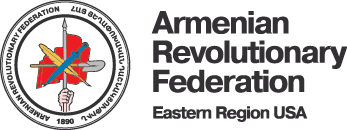Gebeshian Looks to Make History Chasing Her Olympic Dream

CLEVELAND, Ohio—At age 26, gymnast Houry Gebeshian is determined to finally make her Olympic debut this summer. “Gymnastics is definitely a sport for younger athletes,” Gebeshian says, speaking to the Armenian Weekly. “Most gymnasts will peak around the age of 16.” Knowing that the majority of the athletes she is up against are about 10 years younger has not altered her determination one bit, though.
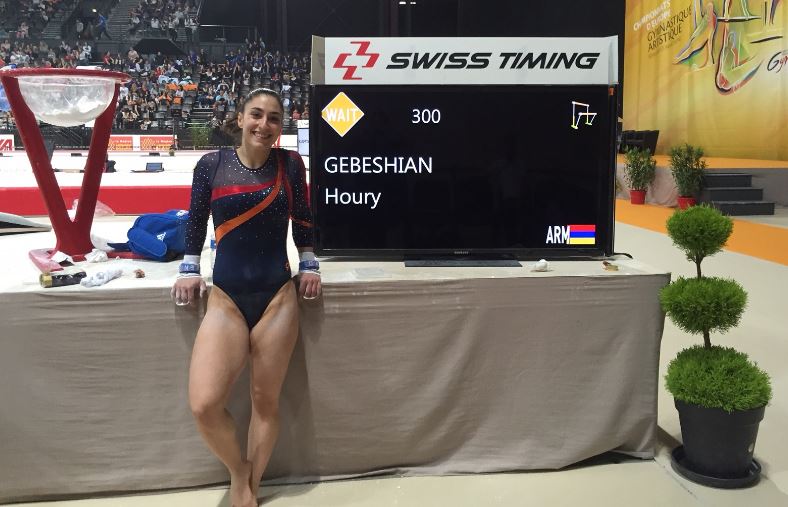
At age 26, gymnast Houry Gebeshian is determined to finally make her Olympic debut this summer. (Photo courtesy of Houry Gebeshian)
Born in Auburndale, Mass., to parents Hagop Gebeshian and Christine Abrahamian, Houry Gebeshian is looking to make history by becoming the first female gymnast to represent the Republic of Armenia at the Olympics.
Her Olympic journey began more than six years ago. “One of my dad’s friends was on the National Olympic Committee of Armenia and they were looking for female athletes—they don’t really have many female representatives. He asked if I would be willing to compete for Armenia, and I thought, ‘Why not?’” Armenia’s Olympic Committee helped Gebeshian obtain Armenian citizenship and she has been competing for the country ever since.
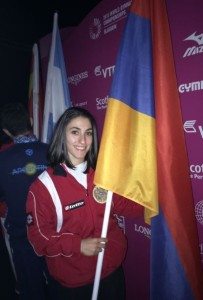
Armenia’s NOC helped Gebeshian obtain Armenian citizenship and she has been competing for the country ever since. (Photo courtesy of Houry Gebeshian)
“I have been to Armenia twice, but for very short amounts of time. Both times I was in college. And as a college athlete, I couldn’t take too much time off during the year. But I went for about a week both times to get my citizenship and meet people,” says Gebeshian, who hopes to spend more time in the country once she gets the chance. “Hopefully once this whole Olympic thing is done, I’d like to travel there and really immerse myself in the culture.”
Gebeshian was born and raised in an Armenian household—speaking the language, eating the food, and embracing all the customs that come along with Armenian family life. “I wasn’t as involved in the Armenian community as I wish I had been,” says Gebeshian, who recently relocated to Cleveland, Ohio. “Growing up, just like now as an adult, I had about a million things going on—training 20 hours a week, going to school, working. Being a part of the Armenian community wasn’t the biggest priority. But luckily, I grew up in a very Armenian household, which spoke the language and maintained the customs and traditions.” Today, she is proud and fortunate to be a part of what she calls a “vibrant” Armenian community in Cleveland.
Gebeshian began her journey in gymnastics early on, when she was barely five. “I was a pretty active little kid. Every little gymnast has a very similar story; they’re all crazy and wild and need to get their energy out on something. And so my family found gymnastics,” Gebeshian says. “My mom tells the story of how I used to crawl out of my car seat while she was driving. I was always very nimble and active.”
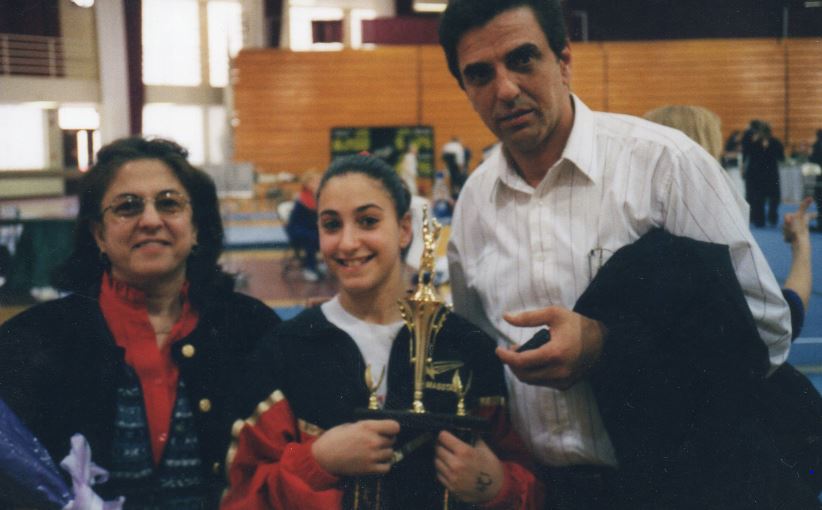
When she was younger, Gebeshian’s mother would encourage her to try competing on a high level. (Photo courtesy of Houry Gebeshian)
When she was younger, Gebeshian’s mother would encourage her to try competing on a high level, but she never thought she was good enough. “When I got a little bit older, I figured, ‘Maybe I can actually do this,’ and here I am,” she says.
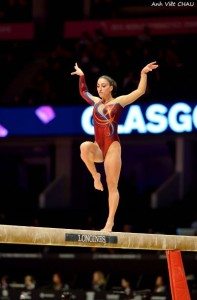
Three years after she decided to leave her beloved sport— Gebeshian made a remarkable and improbable comeback (Photo: Anh Viet Chau)
Gebeshian stuck by the sport she loves until the age of 22. “That was when I attempted to qualify for the 2012 Olympic Games for team Armenia. I didn’t end up qualifying then and so I quit—I thought my gymnastics career was over,” Gebeshian says.
Her hiatus from gymnastics was short lived, however. About a year and a half ago—three years after she decided to leave her beloved sport— Gebeshian made a remarkable and improbable comeback. “I said to myself, ‘You know what? I am not too old, my dream is not over. Why don’t I start up again?’ And so after three years, I started training again, and here I am—almost qualifying for the Olympics again. We’ll see, crossing our fingers,” she says.
Gebeshian will compete in Brazil next month as her final qualifier for the 2016 Summer Olympics taking place in Rio this August. “My chances are really good. There are 36 individual athletes competing for 35 spots. As long as I compete in the way I have been doing, I should qualify for the Olympics,” she says.
Gymnastics has a long history in Armenia. Soviet-Armenian gymnast Albert Azaryan is considered the most decorated Armenian Olympian, winning three gold and one silver for the Soviet gymnastics team. Since Armenia’s independence in 1991, though, no athlete representing Armenia has won an Olympic medal in the sport. Gebeshian now has the chance to make history by becoming the first Armenian female gymnast to quality for the Olympic Games.
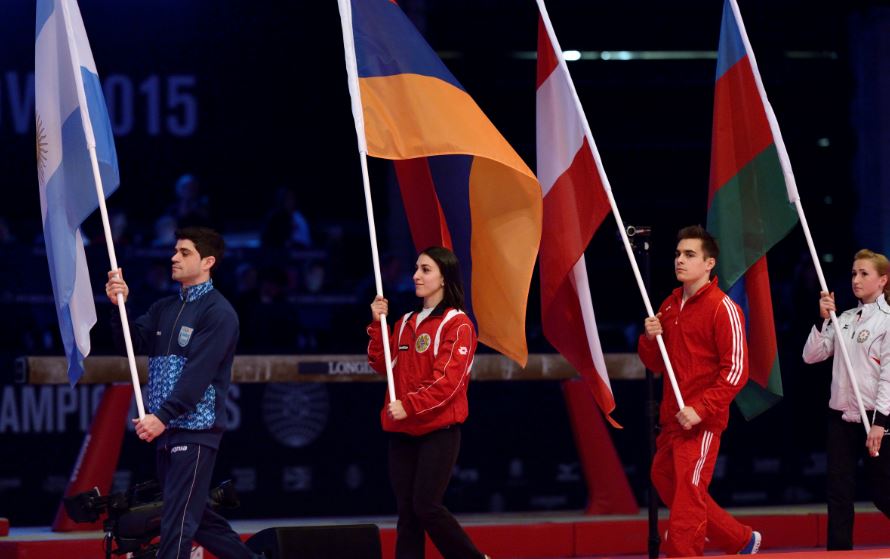
Gebeshian now has the chance to make history by becoming the first Armenian female gymnast to quality for the Olympic Games. (Photo courtesy of Houry Gebeshian)
According to Gebeshian, Armenia has an excellent men’s gymnastics team. One of the athletes, Harutyun Merdinyan, has already qualified for the 2016 Olympics. “Another male Armenian athlete, Artur Davtyan, will be competing with me in Brazil—he’s probably in the top three in Europe and he competed at the 2012 Olympics,” Gebeshian explains. “Armenia also has many great young boys who will develop and compete in the future. Unfortunately, there isn’t much of a women’s program in Armenia.”
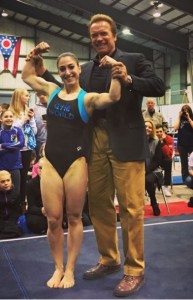
Gebeshian with actor and former Governor of California Arnold Schwarzenegger (Photo courtesy of Houry Gebeshian)
While there is substantial female talent in Armenia, most resources and funding go over to the men’s side. “I’m hoping to change that,” she says. As Armenia’s only female representative in Olympic contention, Gebeshian hopes that her future success will secure some funding and kick-start a program for the women’s team. “I have been there and see what they have in terms of facilities and equipment, and it’s minimal. They are phenomenal athletes, and they have barely anything to work off of. My biggest dream is to develop a proper women’s team and program for Armenia.”
It is with this determination that Gebeshian started a fundraising campaign through the popular GoFundMe platform in February. Her fundraising page has two purposes: to raise money for her Olympic journey and, more importantly, to develop a program for women’s gymnastics in Armenia. “I think that will initially start with Armenian Americans. Gymnastics is a very big sport here in America, so once we build a name for Armenia from here, we can get them more funding and everything they need to have a real program and a team. We have to start somewhere, and I guess for now, it’s going to have to start with my little GoFundMe page,” she says.
Gebeshian has been fully funding herself on what she calls her “great journey” to the Olympics. “Armenia has given me the spot, but I have been responsible for everything else—covering my expenses, travel, participation fees, leotards. Everything is pretty much on me.” Gebeshian also hopes that if people decide to follow in her footsteps, they will not have to go through the struggles and hardships she has had to endure. “It’s difficult,” she says. “But I am a little older [than other gymnasts]. I have a full-time job, so I am able to balance it all, but it would be great if I didn’t have to worry about all that stuff,” she says.
Gebeshian works as a full-time physician’s assistant in the surgery department on the labor and delivery floor of a hospital in Cleveland. “Basically, I deliver babies on nights and weekends and train all the days I don’t work. I only train about 15-20 hours a week,” which pales in comparison to the girls she competes against. “Most will train 30-40 hours a week,” she says.
“I can’t train as much as, say, a 16-year-old can. I have been doing this sport for about 20 years, so my body is a little more broken down. But I actually feel the best I’ve ever felt; I’m doing the best gymnastics I’ve ever done. That comes with adjusting my schedule and training to accommodate to being a competing 26-year-old.”
Keeping up with athletes a decade her junior has definitely been challenging, but Gebeshian—who coaches herself—is determined to continue as long as she can. She has earned a lot of respect throughout the greater gymnastics community for being able to continue and compete against much younger girls. “It’s definitely uncommon. As long as I am healthy, though, I will continue doing the sport I absolutely love.”
“Armenians are really all over—we all originally started in Armenia but as a result of genocide, war, and everything else, we dispersed all over the world. This once-in-a-lifetime opportunity opened up in front of me and so I pounced on it. And I couldn’t be prouder,” she says.
After the Olympics, Gebeshian hopes that her involvement in Armenian gymnastics will help her become more engaged with the Armenian-American community. “I love the Armenian community here in Cleveland. Once I am finally done with gymnastics, I hope that with a little more time, I will be able to be more involved with the community and do more through our church here.”
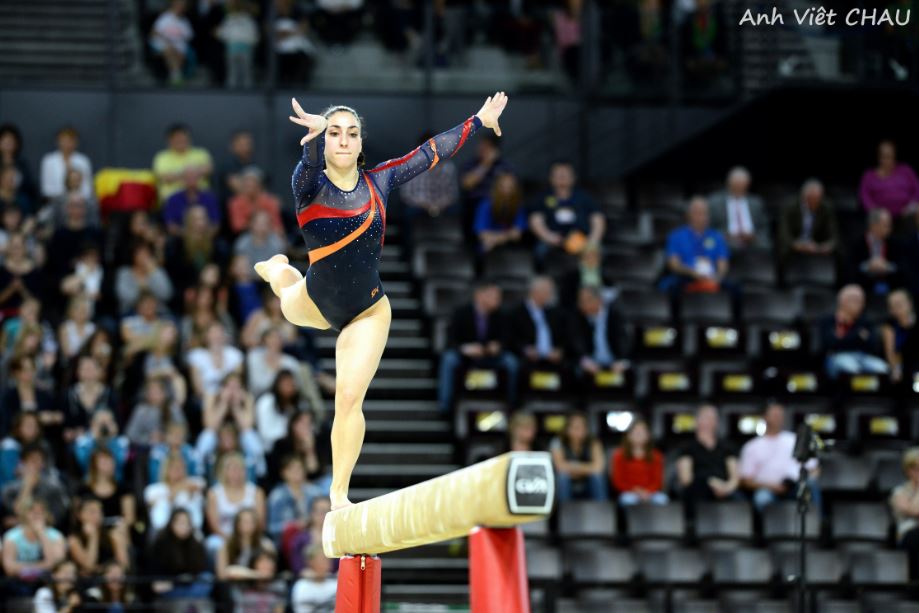
Gebeshian’s final qualifying competition will take place on April 17 in Brazil. (Photo: Anh Viet Chau)
Gebeshian’s final qualifying competition will take place on April 17 in Brazil, and her chances of achieving her Olympic dream—and making Armenian gymnastics history along the way—has never been closer.
To learn more about Gebeshian’s journey to the Olympics and her fundraising campaign, visit https://www.facebook.com/ArmenianGymnast/?fref=ts.
Source: Armenian Weekly Mid-West
